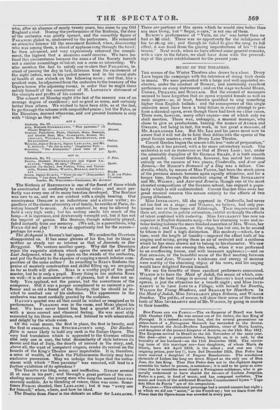MUSIC OF THE THEATRES.
THE season of the Winter Theatres also draws to a close. Drury Lane began the campaign with the intention of doing high deeds • in music. We were presented with a large and well-appointed or- chestra, under the conduct of BISHOP, and containing excellent performers on every instrument ; and on the stage we found HORN, COOKE, PHILLIPS, and SINCLAIR. But the council of managers
seemed to have forgotten that an opera required female as well as male singers—or, at least, females qualified to sing something
higher than English ballads : and the consequence of this sin& omission must have been a total failure in every attempt to per- form a classical opera, even though there had been no other cause. There were, however, many other causes—one of which only we shall mention. There was, unhappily, a musical manager, who chose to give us productions, bearing the names of AURER and
• Orsseow, but being in fact, the work, in too great a measure, of Mr. ALEXANDER LEE. But Mr. LEE and his peers must now be aware that it will not do to foist their ditties into the operas of the great foreign masters, even at Drury Lane Theatre.
Covent Garden began the season with less "note of preparation," though, as it has proved, with a far more satisfactory result. The orchestra is not so numerous as that of Drury Lane ; but, under the admirable discipline of Sir GEORGE SMART, it is both smooth and powerful. Covent Garden, however, has rested her claims entirely on the success of two pieces, Cinderella, and Azor and' Zenzircs,—for BISHOP'S Romance of a Day was a failure. Cin- derella, which, by means of Miss PATON, had been the stock-piece- of the previous season, became again equally attractive, and for a longer time, through the excellent singing of Miss INVERARITY and Mr. WILSON; and Azor and Zenzira, though one of the most elevated compositions of the German school, has enjoyed a popu- larity which is still undiminished. Covent Garden thus owes her great musical success this season entirely to the efforts of two young debutants. Miss INVERARITY, till she appeared in Cinderella, had never set her foot on a stage ; and WILSON-, we believe, had only per- formed two or three times at Edinburgh. Their improvement in their art, and rise in public estimation, exhibit strikingly the effects of talent combined with industry. Miss INVERARITY has now no. superior in English dramatic song—for her charming voice and in- tense feeling balance the more finished execution of Mrs. WOOD, her only rival ; and WILSON, on the stage, has but one, to be second to whom is itself a high distinction. His modesty—which, for a time, went the length of timidity—impaired the effect both of his- singing and acting, giving them an air of restraint and a coldness which he has since shown not to belong to his character. We saw Azor and Zemira one evening this week, when it was performed to an overflowing house, and with incessant applauses ;—and on that occasion, in the beautiful scene of the first meeting between Zemira and Azor, WiesoN's tenderness and energy of manner were worthy of the charming object of his vows, and his singing would have delighted SPOHR himself.
We see the benefits of these excellent performers announced. WILSON is to have the Maid of Judah, the music of which, con- sisting of the best things in several of Rossisn's least successful operas, is just the attraction for a benefit-night ; and Miss
INVE-
RARITY is to have Love in a Village, with herself for Rosetta, WILSON for Young Meadows, and BRAHAM for Hawthorn. In the Maid of Judah, Miss INVERARITY plays Rebecca, and WILSON Ivanhoe. The public, of course, will show their sense of the merits both of Miss IsiVERARITY and of Mr. WILSON, by going in crowds to their benefits.


























 Previous page
Previous page